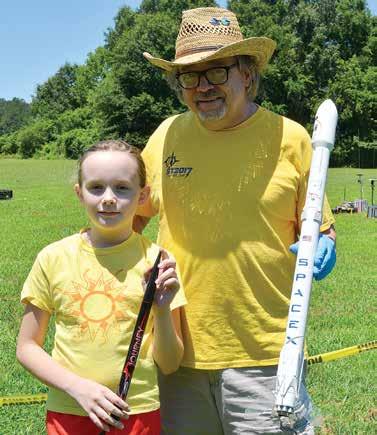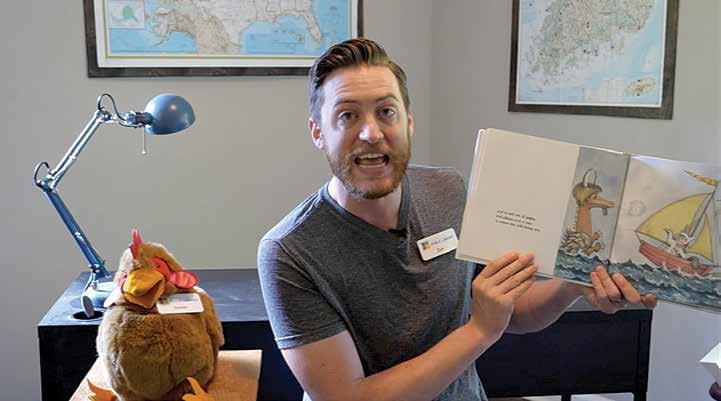
30 minute read
The Colorful Woven Threads that Make Up the Fabric of Our City
Gwinnett County is getting more and more culturally and racially diverse. Remember the old adage ‘Variety is the spice of life’? In today’s climate of social unrest and world-wide protests for racial justice, we should move towards healing by getting to know our neighbors and broaching some delicate conversations. It can be scary and cathartic — and it can be a little heartbreaking, too.
The heartbeat of Peachtree Corners is strong because of the amazing people who live and work here. I reached out to some from a variety of backgrounds. Each of their accounts will have you shouting, Vive la différence!
No matter what their jobs, ages, political leanings, religious beliefs, ethnicity or color of their skin, each one has essentially come to the same conclusion with regard to moving forward through the turmoil that has been unleashed in the wake of George Floyd’s death. It’s a focus not on what divides us, but on what can bring us all together. It’s the inevitable acquiescence to an aphorism anyone can support — love is always the answer.
Vitals
From the United States Census Bureau’s QuickFacts about Peachtree Corners, it’s easy to glean some of the latest statistics about the elusive 16.23 square miles that constitute the largest city in Gwinnett County. I say “elusive” as many citizens might have trouble envisioning our city’s borders. In our defense, it was incorporated just eight years ago, on July 1, 2012.
What makes our community a Top 10 best suburb, and one of the best places to live in the State of Georgia — besides quality education, low crime rate, desir able cost of living, employment, access to amenities and general livability? The great diversity in housing options, places to worship, the cultures represent ed here, the businesses and the amazing residents we share our community with, of course.
43,905 Population
$67,949 Median Household Income
9.9% Poverty Rate
71.7% Employment Rate
Photography by George Hunter
Jay Patton
Traditional Master Barber Jay Patton moved to Peachtree Corners two years ago from Minneapolis, Minnesota. He noted that his hometown is less diverse, primarily Caucasian, and he’s been enjoying the “good mix” of people here.
“In Minnesota, growing up, there was more racial tension,” Patton said. He felt a larger divide between the privileged and the underprivileged. “There’s less opportunity for certain people in certain states. You come down here and if you have a good credit score, you blend in as long as you’re putting out good vibrations,” he explained.
At your service
After working near Perimeter Mall for five years at Gino’s Classic Barbershop, he decided to venture out on his own. “One of my customers told me about Blaxican,” Patton said. The fusion restaurant serves food inspired by Southern soul cooking and Mexican classics. “Being biracial, I thought that concept was catchy. I came here, drove around a bit and I felt good energy,” he recounted.
Patton opened Traditional Shave Masters Barbershop at 5260 Peachtree Industrial Boulevard. “This area is blowing up. I think it’s going to be bigger than Sandy Springs,” he said. He likes the plans for the area.
The barbershop offers “male services — straight edge razor work, blades, steam towels, shavJay Patton
ing beard work. With different packages to choose from — like The Distinguished Man, The Exquisite Man, The Classic Man — there’s something for everyone. Female clients with short hairstyles are welcome too,” Patton said.
Things had started picking up well, “and now we’re going through this Corona stuff. It’s pretty challenging,” he shared.
Cutting through racial lines
Patton prides himself on being able to serve the whole community, no matter what race, background or ethnicity. “Most shops are racially separated. People are more comfortable coming in when they see people who look like them,” he said.
Men have different ways to describe how they want their hair and beards trimmed, depending on their ethnicity, where they’re from, race and even social status, according to Patton. “It’s up to the barber to ask the right questions to really understand what the client wants so you can hook him up,” he said.
Patton could pass for either white or black. “The way I look, people don’t know. I’m chameleon-like. My father is Creole and my mother is Puerto Rican. That’s a loaded soup bowl,” he chuckled. “I had a mother who respected me and explained everything. She watered my seed and I had self-esteem. I love all people. We’re all connected. We’re all on this Earth together.”
He thinks a lot of people would be surprised if they did their 23andMe genetic reports. “I did it and I was mind-blown,” he reported. “I grew up Puerto Rican, but in actuality, I started off Indonesian! I have some Egyptian, French, Spanish, Portuguese, British, Irish, German, Apache Indian, Sanda Gambian — things I had to look up! It was surprising to me. It opened up my eyes.”
He added that people mistake him for Egyptian all the time, “so it was interesting to find out I have some Egyptian in me. I love telling the dudes in Duluth, I started out Asian!”
Still, Patton said, at the end of the day, it’s all the indoctrination and cultural stuff that gets in the way. “We’re all the same color on the inside,” he said. “When we’re little, we play and hang out together. Somewhere in the mix, we get taught all these differences.”
“I feel like I have a broader truth, a natural perspective in the spiritual world,” Patton continued. “We are all connected, but some people like the divisions. They’re capitalizing off of us: the red, the blue, the white, the black, and all that junk. As soon as we figure it out and start loving each other again, it’s going to be alright.” ■
Dr. April Hang, PharmD
Dr. April Hang, PharmD, hails from Petersburg, Virginia and is of Filipino heritage. Her dad was in the Army, so her family traveled a lot. She spent a long time in Germany, where she learned to speak a little of the language, and she studied at Virginia Commonwealth University – Medical College of Virginia School of Pharmacy.
Dr. Hang is Catholic and attends St. Monica Church. Her husband is Buddhist and their three children have been baptized in the Catholic faith.
She opened Peachtree Pharmacy at 5270 Peachtree Parkway in 2012. It’s a compounding pharmacy were medications are customized. “Our clientele is diverse. We serve Hispanics, African Americans, white Americans, Asians. We have seniors all the way down to babies and pets that we take care of,” Dr. Hang said.
“Compounding is an outof-the box option for patients who have exhausted all their options and want to try something else. We do carry some traditional medications as well,” she explained. “It takes time to make everything. You have to make sure all the ingredients are included. You’re not just pouring pills out and counting them. You actually have to melt something down, make lollipops, gummies, lozenges or capsules. We have to do our math calculations carefully to make it the exact strength the physician wrote it for.”
Mom-preneur
“I’m first generation American, as well as the first person to start my own business in my family,” Dr. Hang said. She attributes her drive to her dad, who always endeavors to find a solution.
She said that she feels welcome here. “It’s like a small town. That’s why I love Peachtree Corners,” she said. “A lot of our patients are like family to us. This is a great city, a great place to have a small business, especially with Peachtree Corners expanding.”
THC and CBD advocate
One of the things Dr. Hang has gotten involved with is the effort in Georgia to make low THC oil (less than 5%) available to patients suffering from chronic pain, cancer, PTSD, HIV, autism, dementia, Alzheimer’s and other conditions. “I feel like [CBD/THC] oil can help several patients,” she said. “It’s yet another alternative for people.”
She said that doctors can help a patient get a medical card for it. “Everything has been passed in Georgia, and there is a THC oil registry here now, but there’s no access. I think there are over 14,000 patients registered. They have the card, but there is no place where they can go buy it yet,” Dr. Hang said. “We’re just waiting for the infrastructure so people can start applying for manufacture and distribution.”
Unfortunately, the process to get access has been delayed due to COVID-19. It’s likely to be another year or two before access is available for patients.
Diversity at the pharmacy
Dr. Hang welcomes students of diverse backgrounds, some from out of state, who do rotations at her pharmacy. “Most of the time, I say ‘yes,’ because the students are up-to-date on the new things. They keep you updated,” she said. “I try to make it practical for them. They work in the store. I take them to a marketing event. I like to do a couple of little health fairs. I mix it up for them so that they see what we actually do. I didn’t get that when I was in pharmacy school.”
There have been times when a staff member has had an unpleasant interaction and they feel that some racism was directed towards them. “I have Dr. April Hang, PharmD
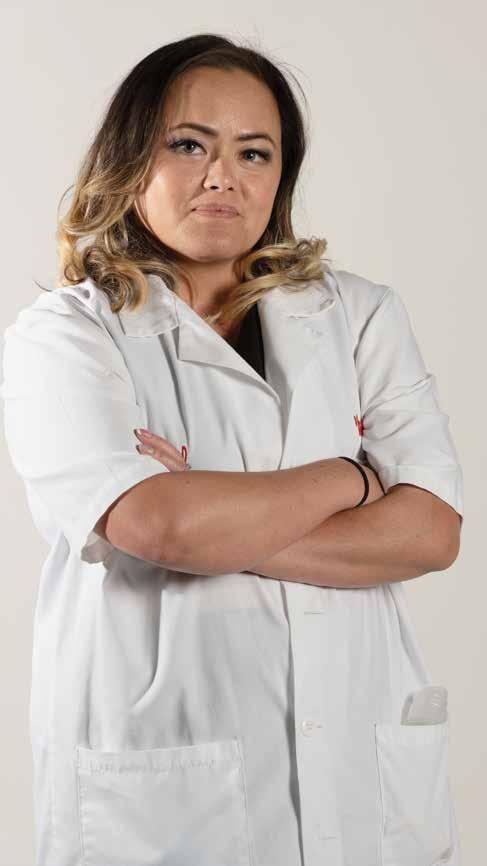
one full-time pharmacist, three part-time pharmacists and three full-time pharmacy technicians. One is Asian and the others are African American,” she said.
As Dr. Hang was cleaning the store one day, an older lady came in, looked around and asked, “Why is everybody black in here?” She said, “I don’t see anything wrong with that. There are standards and testing that you have to pass in order to be in this position. Everyone here is qualified.” Dr. Hang added that she has never had issues with racial tensions personally. “It’s a little disheartening that it still occurs,” she said.
She suggested a city-wide cultural festival to help improve racial tensions. “If we can learn more about our neighbors, we’ll be able to understand them better. There are a variety of cultural backgrounds in Peachtree Corners, so let’s celebrate them!” ■
Maurie Ladson
Maurie Ladson is a Program Director at Corners Outreach, an organization providing a multigenerational approach to helping underserved children with specialized tutoring. Parents are given assistance with career paths, workshops, unemployment and anything they may need to navigate in the education system. Their goal is to achieve a 100% high school graduation rate among the students they serve.
Ladson clarified underserved as “communities or people living amongst us who don’t have all the necessary resources.” She explained, “They may not be earning a living wage. A lot of them are immigrant families. There’s a challenge with education and the language.”
Elementary, my dear
By focusing on elementary school students, the intention is to prepare them for success in middle school and high school. “Then hopefully, to higher learning, either a four-year education or, sometimes, they prefer to do some kind of trade,” Ladson said.
The Corners Outreach offices are located in Peachtree Corners. Ladson said that Executive Director Larry Campbell liked the name, “as the goal is to touch “every corner” of the community.” The organization partners with Title 1 schools in DeKalb and Gwinnett counties, including Peachtree Corners and the surrounding areas, and helps 450 families/children.
“We work with them during the normal school year; we provide after-school tutoring for two and a half to three hours. We’re supplementing and enhancing what the school is teaching,” Ladson said. “There’s a big focus on reading comprehension and math. We then provide nine weeks of summer camp which focus on reading, math, games and a craft.”
School principals identify the children in most need. There is also input from counselors, teachers, teacher liaisons, center coordinators and ESOL [English to speakers of other languages] coordinators. “We also have volunteers that play a key role in our success. We’re so thankful,” she said. “Schools like Wesleyan, GAC, Perimeter Church and individuals in our wonderful Peachtree Corners community come out and volunteer their time.”
Masks with a purpose
Due to COVID-19, Corners Outreach was unable to tutor or assist families in person for some time. “We began communication via Zoom, WhatsApp, video chat, telephone calls. There was a big need to assist in setting up Internet. Many of the families didn’t have it,” she continued.
“Our organization was able to place Chromebooks in the community for children to be able to do their homework. It was still challenging because in a lot of cases they’re sharing either a phone or a hot spot. With two to four children in the family of various ages, needing to do homework with one device, that was difficult.”
To help underemployed parents, the organization developed Masks with a Purpose.
After surveying the parents, they found they had 101 mothers with sewing skills that could be used to provide much-needed masks in the community.
“They sew masks and earn a living wage, $4 per mask,” Ladson said. “We launched the Corners Store on June 22 so people can go online and purchase a mask to support our cause.” To purchase a mask, visit cornersoutreach.org. If you don’t need a mask, you can help by giving a donation. Beauty in all colors
“I’m Mexican American,” Ladson said. “I’ve been in Peachtree Corners for 20 years. My husband is black, dark-skinned African American. People might look at us a little differently. I’m different and I’m good with it.”
She and her husband Ron recently celebrated 20 years of marriage. “I think in Georgia, Atlanta and in Peachtree Corners, we still have room to grow,” she continued. “I’ve seen a different level of acceptance, if we’re going to call it improvement, absolutely.”
Having been on the receiving end of surprise when people learn she’s of Mexican descent, Ladson wishes people would realize that Mexicans, too, come in all shapes, sizes and colors. “If we just open up our minds a little bit, there’s room for so much beauty and intelligence and so many differences,” she said.■
Maurie and Ron Ladson
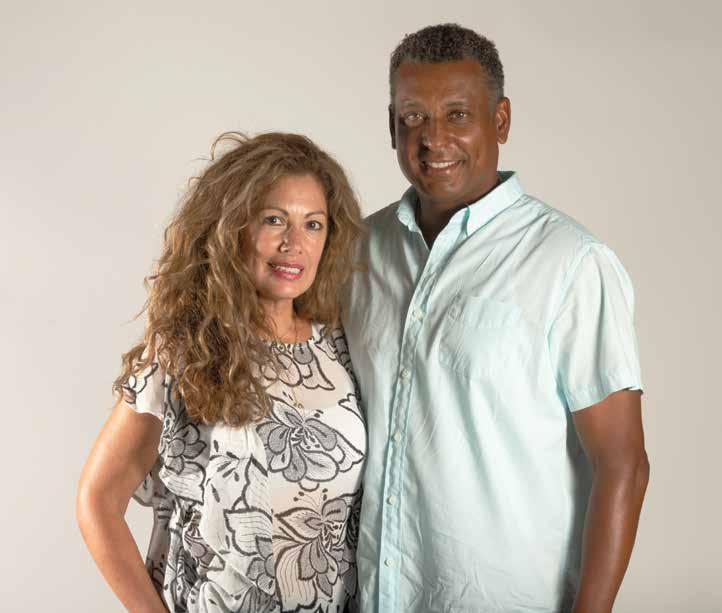
Miriam and Ed Carreras
By pure coincidence, Miriam and Ed Carreras shared a similar history predating their marriage of 48 years. They both left Cuba with their families at a young age, and within five to seven years, they became naturalized U.S. citizens.
After a 20-year career as a microbiologist at Children’s Healthcare of Atlanta, Miriam is now a Realtor with RE/MAX Prestige. “I guess, given my name and former clients, I get quite a few referrals from Spanish-speaking buyers. I would say most of my clients right now are Hispanic,” she said. Hispanics, who can identify as any race, make up 15.2% of the population in Peachtree Corners.
Ed was an attorney with The Coca Cola Company for about 20 years. He retired from the company in 2003 and joined a law firm. He retired from the firm in February of this year. “We were supposed to travel, and now we’re homebound because of COVID-19,” he said.
As an attorney, much of his work was international. “I dealt with a number of countries, like Japan, countries in Europe, in Latin America, and so on,” Ed shared.
He served on the Board of Goodwill of North Georgia for a number of years and was Chair of the Board for two years. “Goodwill had a significant relationship with the Hispanic community. One of the things I got involved in was developing a robust system for their strategic plan,” Ed said.
In studying the projection of population changes, he and his fellow board members identified the important growth of the Hispanic community and the need for more Hispanic contacts and people with language skills in the organization. A home in Peachtree Corners
The Carreras family built their home in Neely Farm in 1998. Both are happy with the amount of diversity in Peachtree Corners. “I think there is a good mix of people. You see a nice diversity of cultures represented here,” Ed said. “My experience is more in the restaurants since I like eating. We’ve gone to a lot of different types.”
“I think there’s pretty good diversity,” Miriam added. “Even in our subdivision, we’re diverse.”
They haven’t had any negative experiences because of their ethnicity in recent years. As a teenager, Ed recalled an incident at a restaurant in Miami. His family was speaking Spanish, and a man at a nearby table addressed them, saying, “Go back to Cuba!”
“My father was surprised. He turned around and in perfect English said, “I’m sorry, does it bother you if we speak Spanish?” The guy ended up apologizing,” Ed remembered. “I was 13 or 15 at the time. It stuck in my mind because my father handled it so perfectly. The guy said, “You speak English very well.” My father said, “Yes, I was educated in the United States. I went to an Ivy League school.” The guy just kept shrinking.”
Ed said that everyone carries prejudices based on faulty stereotypes. “From my own experience, the best way to eliminate prejudice is to be made aware that the stereotype supporting the prejudice is not correct,” he explained. “Anything that helps an individual realize that the stereotype is wrong should help in reducing prejudice.”
“Education highlighting non-stereotypical members of a group could help,” Ed suggested, “as well as the promotion of events that bring members of diverse groups together in a social setting.” ■
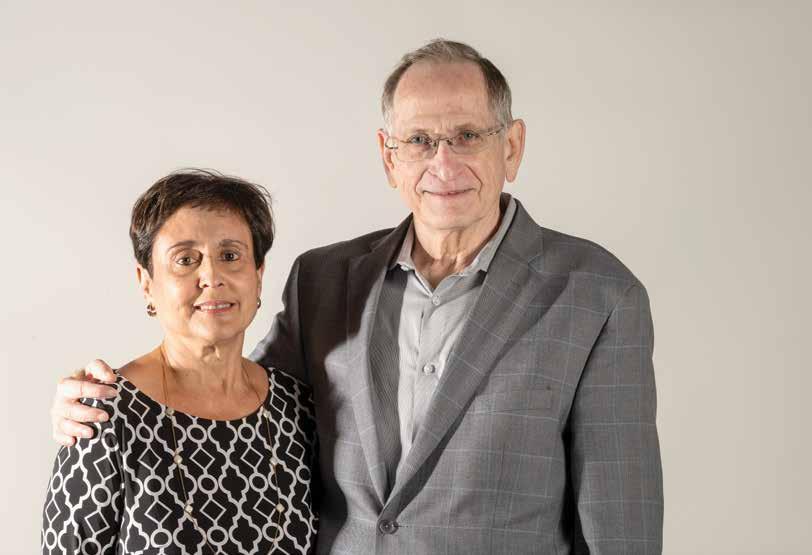
Joe Sawyer
As the city is building a physical pedestrian bridge over Peachtree Parkway, resident of 25 years and equity warrior, President and Cofounder of Bridges Peachtree Corners Joe Sawyer has been launching intensive volunteer efforts to build metaphorical bridges between races and social classes in the city. “I guess you can say it’s about black and white; we’re trying to bring equality up to where it needs to be,” he shared.
Bridges is a non-profit funded by grants and generous donations from the community. The board is made up of a diverse group who share Sawyer’s mission to close the gap between the affluent and the less affluent parts of town. They’ve been working on racial diversity and economic disparity since 2013.
Through school counselors, they identify needs at Peachtree Elementary and other area schools, assisting in any way they can — from electric pencil sharpeners in the classroom to Christmas dinners for families. They’re currently partnering with xfinity to provide internet access so children can do their schoolwork at home during the pandemic.
Affectionately known as Preacher Man, Sawyer would love to help more areas of the city reach their potential. He espouses the Holcomb Bridge Corridor Project , the city’s planto revamp the area, and hopes it will get underway soon. “We’ve done the easy part, the Forum and Town Center area. Now let’s roll up our sleeves and do the hard part,” Sawyer said.
Sawyer comes clean
This is a man who will “tell it like it is.” He is refreshingly unafraid to level with you. Sawyer attends Life Center Apostolic Church in Dunwoody. His faith shines through in everything he touches, including his company name of 20 years, Alpha Omega Carpet Cleaning, inspired by the book of Revelation.
Since many are home with more time than usual on their hands, the pandemic has Sawyer busier than ever. “I build relationships with my customers. By the time I leave their house, I’m their friend,” he said. He also prides himself on his effective carpet cleaning services, which avoid harsh chemicals, as he is a cancer survivor.
The United Nations
Together with his wife Kimberly of 31 years (who is white), Sawyer has raised his two daughters, now 29 and 23. “She’s my backbone. She keeps me grounded,” he said. His daughters are now raising his five grandkids in Peachtree Corners.
The Sawyers have two blond, blue-eyed grandchildren and three who are light skinned black. “I’ve got everybody in my family — we have the United Nations over here,” Sawyer laughed.
In 1992 things were more challenging for biracial couples. Sawyer’s in-laws didn’t allow him into their home until two years after the marriage; now they’re the best of friends, despite many earlier battles.
Sawyer noted that things have changed for the better. “It’s a new generation, we’re improving a whole lot,” he said. He’s unaware of any negative issues experienced by his daughters about being biracial.
While Peachtree Corners is very diverse, Sawyer said he still experiences some people who are prejudiced. During a recent job, a client had left the door open for him. It saddened him to learn that his client’s neighbor reached out to inform her, saying, “There’s a black man in your house.”
“[Racism] is still there, but overall, I think Peachtree Corners is a welcoming community. You might have some people stuck in their ways, but you just have to learn to overlook them. We stopped and we said a prayer for the lady,” Sawyer said. Joe and Kimberly Sawyer
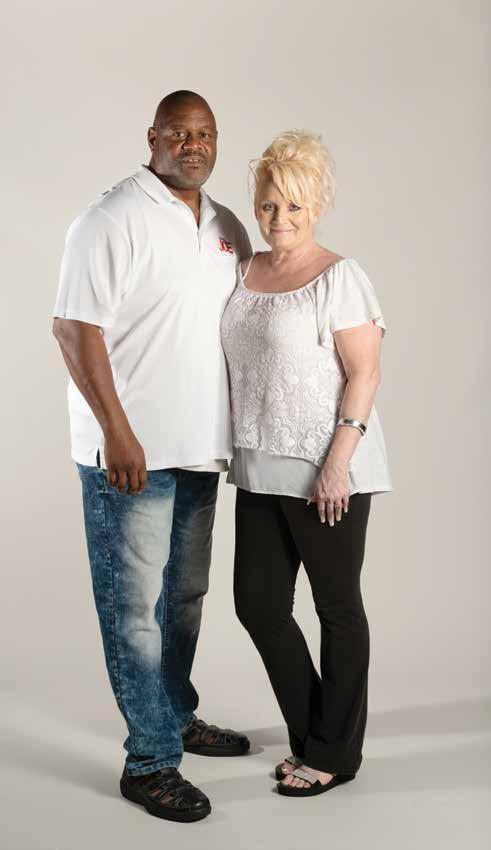
He believes the cause of divisiveness is that some people don’t want to lose control of what they’ve got. “As long as we feel that one race is better than the other, we’re always going to have a problem. Both communities have work to do. Now is the perfect time for us to work on race relations in America,” Sawyer affirmed.
Preacher Man
“We have to come together,” he continued. “I’m thankful for the friends the Lord has put in my life. We have to change our perception of our neighbors. Not all people of a different race are bad. Be there for your friends.”
Sawyer added that everyone needs to work on racism as a society. “The whole world sees what’s going on, politicians fighting over this and that. We don’t have any togetherness,” he said. “Let’s take a stand and let’s be one. We claim to be one nation under God but how can we be under God if we’re at each other’s throats?”■
Father Darragh Griffith
Rev. Darragh Griffith is originally from Dublin, Ireland and has been in the U.S. for 24 years. Following 10 years at Holy Family in Marietta, he’s been the pastor at Mary Our Queen (MOQ) — the only Catholic church in Peachtree Corners — for four years.
“We welcome the community to come see our new church. It’s a beautiful, traditional church based on Saint Gerard’s in Buffalo. If you’re exploring questions about the Catholic faith, we’re here,” Father Griffith offered.
Though the present church is just a year old, the parish has been here since 1998. The pews, stained-glass windows and altars were taken from the old church in Buffalo, New York.
Mass during the pandemic
“We’ve been live-streaming masses on YouTube and our website. But now we’re back,” Father Griffith said. The church has an outdoor mass on Sundays at 8:30 a.m. for people who feel more comfortable outside, and services in the church on Sundays at 11 a.m. and Saturdays at 5 p.m.
Masks and social distancing are expected at the indoor services. Seating is roped off to allow for every second pew to be occupied. “It’s working out for this time,” he said.
The parish
The makeup of the MOQ parish is quite diverse. “We’ve got people from every continent. We have a lot of Asian people from Vietnam, for example. People from the African continent, Nigeria and other countries, Hispanic and white Anglo, as well,” shared Father Griffith.
MOQ provides spiritual and financial outreach to Peachtree Corners families through The Society of St. Vincent de Paul (SVDP). Volunteers make home visits with families and individuals who call the helpline seeking food or financial help.
Since the outbreak of the coronavirus, MOQ SVDP has assisted over 150 individuals. The help line number is 678-892-6163.
The domestic church
For Father Griffith, what happens at home is as important as what happens at church. “In these times, I believe the home is crucial. Parents have a great and joyful responsibility. The family has never been as important, from where we stand, as it is now,” he said. “That’s where you can lead by witness to your children. Not so much by words, but by example. The family is crucial.”
He said that the church has always taught that the home is the domestic church. “The home is where parents hand on the faith to their children. I think that’s crucial,” Father Griffith said. “My work, the church’s work is not going to bear fruit if it’s not happening at home.”
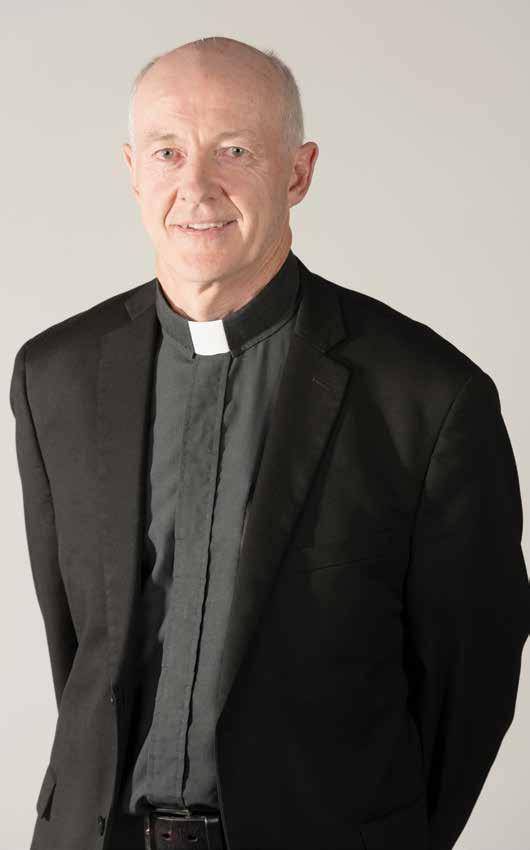
Spreading God’s love
“It’s sad to see some of the things that we see on TV, some of the violence. It is kind of sad and disturbing, what’s happening,” Father Griffith said. “The church believes in treating everyone with respect and love. We’re a universal church. We love and accept everyone. In the Catholic faith, we’ve got people of all sorts of cultures, backgrounds, traditions.”
For a solution to today’s troubled climate, Father Griffith leads with the suggestion that we respect one another. “We’re all made in the image of God. Everyone is precious in God’s eyes. Every person is created through God’s love,” he said. Father Griffith said that he knows it’s been hard during the pandemic for people to meet up, interact and socialize. “If we can get together and have that as a base, we’ll not be afraid of each other,” he said. “And love, that’s what Jesus spoke about, loving all people. That’s what our Catholic faith teaches us.” Faith is critical for Father Griffith. “If we’re living our faith, that informs our decisions and our behavior. As it says in Scripture, our lives should be based on faith and our relationship with God,” he said. “Hopefully people will be open to God and to His Spirit at this time.” ■
Rev. Darragh Griffith
Karl Barham
Karl Barham, President of Transworld Business Advisors of Atlanta, Peachtree, started the business with his wife, Ann, two years ago. They own a local office of the franchise in Peachtree Corners.
“We relocated from New York City, got married and started a family here,” he said. “We found Peachtree Corners to be a fabulous place to live, work and raise a family.” They’re a Christian family and attend Perimeter Church.
Barham explained business brokers specialize in buying and selling businesses. “We do small, neighborhood businesses — any size, up to maybe about $25 million. We arrange to find the buyers and we help them get the deal done.”
Growing up black
“I’m first generation in the U.S. My family is from Jamaica, the third poorest county in the Caribbean. They came here, raised their kids and we’ve done well,” Barham said. “But I do see, for a lot of people who are very specifically black, they’re not looking for handouts or anything, they just want the proverbial knee off the neck.”
“When you’re in a minority, you always think about race,” he continued. “Jamaica is a mostly black country. When I spend time there, everyone looks like me. In the U.S., it’s the reverse, and as you move up in corporate America, it’s even more of the reverse. It’s always there to think about.”
Barham’s dream and hope for the future is that his kids don’t have to deal with the kind of discrimination that he’s seen in his lifetime. “Changes need to happen in this generation. Will it change in my lifetime? I don’t know. I thought it would,” he said. “When I was a young kid, my dad was saying the same things. I said, “Oh, by the time I’m your age, that stuff will all be solved.” I was wrong. It isn’t.”
Starting a conversation
When Barham received inquiries on what people could do in their companies about racial justice, he thought it would be a good topic for the Capitalist Sage podcasts that he regularly hosts with Peachtree Corners Magazine publisher Rico Figliolini. So, they began a series of podcasts about diversity and race.
“It’s been a topic discussed nationally, and we said, ‘what about here? Is there anything going on locally?’” he said. They produced three episodes, with two to three guests on each. “We talked about racial and social justice in leadership and in the local community,” Barham said. “We had stay-athome moms, elected officials, church leaders and faith leaders, just talking about what it means and how they’ve been reacting to what’s happening with Black Lives Matter. We asked: what can citizens can do individually? What can local leaders do? We just wanted to start a dialogue.”
A note of hope
Barham said he sees a lot of people coming together to help advance social justice, including racial justice. “I think we should lift those people up. We should elect them to office,” he said.
And he sees a lot of things to be hopeful for. “When I look at the community here, I see more people of color starting businesses,” Barham reported. “In the last 10 deals that we’ve done, more than 50% of them had a person of color on one side of the deal or the other. Things are changing in society — and things can and will continue to get better.” ■
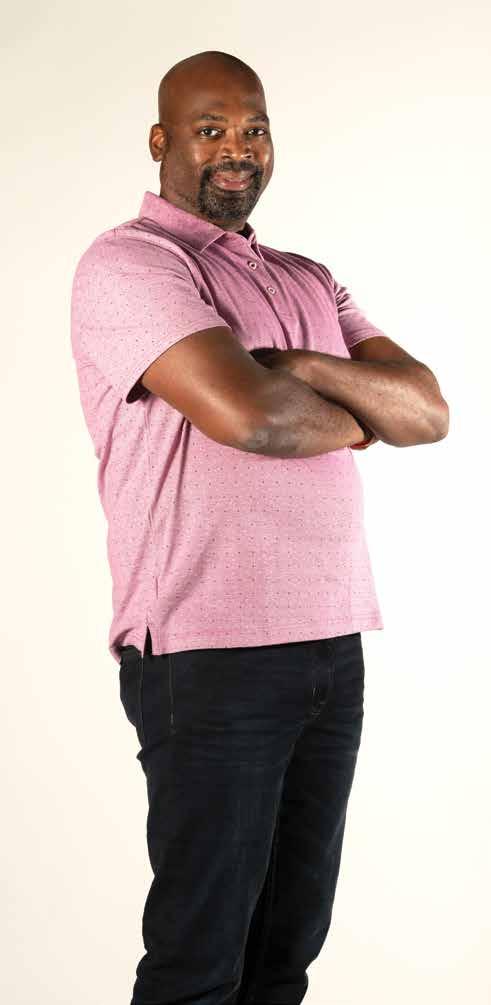
Karl Barham
Diverse Perspectives, the Same Conclusion
It’s easy to see why niche.com gives Peachtree Corners an A+ for diversity. Let’s move forward holding hands (figuratively, of course), leaving injustice behind and making the fabric of Peachtree Corners stronger and more beautiful than ever before.
“We must continue to go forward as one people, as brothers and sisters.” ~ Rep. John Lewis
Internships in the Time of COVID-19 How Brightree continues development of young professionals
Internships are a key steppingstone on the path to success for college students and recent graduates, but many have seen that important growth period deferred or taken away amid the COVID-19 crisis. Brightree, a software company based in Peachtree Corners that caters to post-acute healthcare, wanted to find a way to continue their thriving internship program in a safe, beneficial manner for both the interns and the company.
The 2020 Brightree Internship Program
“We had to step back and say, ‘How do we want to approach this internship?’ And it was a challenge, because most of our managers (who are part of the internship program) are used to managing people on-site. It was a huge adjustment,” said Trish Nettleship, Vice President of Marketing at
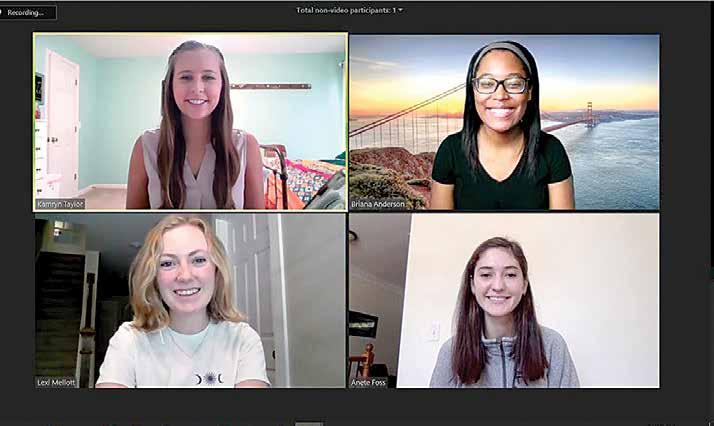
Left, Brightree 2020 interns in a Zoom meeting. Top left, Kamryn Taylor, Marketing Sales Rep Intern. Top right, Briana Anderson, Marketing Intern. Bottom left, Lexi Mellott, Marketing In tern. Bottom right, Anete Foss, Graphic Design Intern. (Photos courtesy of Trish Nettleship)
Brightree.
Valid concerns were raised regarding working remotely with interns who may require additional guidance. Nettleship and other leaders felt strongly that providing learning opportunities in a real business environment was something that needed to go forward despite the extra challenges that a virtual internship program would present.
This is the fourth official year of the Brightree internship program, though Brightree has intermittently employed interns prior to that as needed. It’s typically a 10-week summer internship program from mid-May to late July, with all interns starting at the same time and collaborating on various work projects. Students in the program were treated just like any new hire, with orientation and being assigned a buddy to assist them and show how team dynamics work at the company.
“(The internship program) has become more and more crucial to our business, quite frankly. The interns, they are younger, they are in college, they are coming in with a fresher perspective than what we have,” said Nettleship.
The Fabulous Four Interns
The number of interns that Brightree took on for the summer was reduced to four individuals, as opposed to the standard 10 to 15 people. Kamryn Taylor served as the Marketing Sales Rep Intern, Aneta Foss was the Graphic Design Intern, and the two additional Marketing Interns were Briana Anderson and Lexi Mellott.
“I was actually really grateful that Brightree was still having their internship,” said Foss.
Every day, the four interns met with the marketing team on Zoom for a daily stand-up to see what had been done on their on-going projects. Foss’ role was more visual and instructional, working on e-book informational guides and supplemental graphic design projects as they arose. Taylor worked directly with clients, as well as cold calling, hoping to walk through interactive tutorials of Brightree’s software offerings.
The two marketing interns “assisted the team in areas of marketing communications, marketing research, and digital marketing. That translates to researching the industry to provide insight for content for the blog and the website, and to provide insight into the brand’s digital footprint,” according to Anderson.
The main issues that came up had to do with longer task completion times simply due to working in different places, as well as having to relay complex information such as new software techniques over the phone versus having the luxury of a manager talking through it face-to-face. However, the four enterprising women rose to the challenge and steadily improved as the weeks went on.
“The company did a really good job, because they scheduled one-on-ones with each member of the team, trying to get to know me and I’m getting to know them. I could reach out to anybody if I needed help,” said Foss.
Taylor also expressed positive
views about how the internship program was run. “I would say, despite being online, everyone has been really helpful and really good with communication,” she said.
Anderson had this to say about her time at Brightree: “I’ve learned so much during this internship, but I think the things that have meant the most are not the technical skills but rather what I’ve learned about what I want in a work environment. Brightree has shown to me how much I value the collaborative work environment. Everyone is involved in ideation and planning, even if they won’t be involved in the creation of assets until later down the line — and I love that!” Anderson said.
What to expect
The future for these young ladies looks blindingly bright. Taylor is a rising senior from the Uni
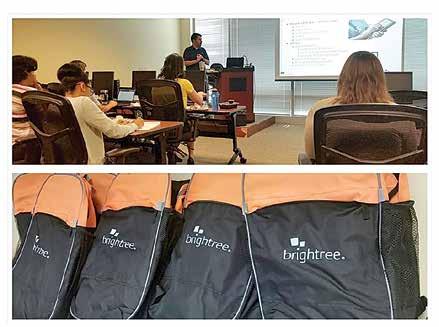
versity of Georgia who plans to continue her career in sales. Foss is a junior at Georgia State University with aspirations to land a graphic design position with a company similar to Brightree after graduation.
Mellott, a local graduate of Wesleyan School, is pursuing a Bachelor of Science in Business Administration at Georgia Tech. Anderson is entering her fourth year at Georgia Tech and currently deciding between the career paths of UX/UI Design or Marketing.
With the current state of the worldwide business marketplace so in flux because of COVID-19, it is encouraging to see a Peachtree Corners company standing behind the workforce of tomorrow, giving them a foundation to build on. ■
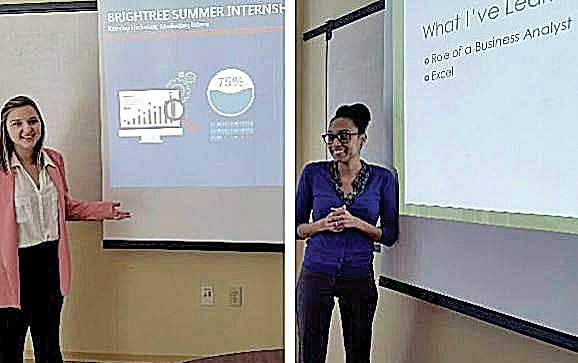
Top, a throwback to the 2017 Brightree Internship program. The interns were treated to a product overview presentation and received official Brightree backpacks and other goodies. Above, another look back at the 2017 Brightree Summer interns as they presented a recap of their projects and experience to the executive team. Kensley, Marketing Intern (left) and Anissa, Business Analyst Intern (right). (Photos Brightree’s Facebook page)


